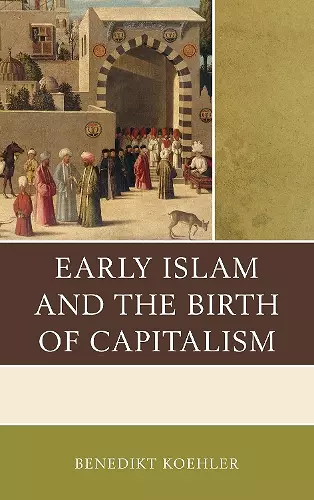Early Islam and the Birth of Capitalism
Format:Hardback
Publisher:Lexington Books
Published:17th Jun '14
Currently unavailable, and unfortunately no date known when it will be back
This hardback is available in another edition too:
- Paperback£43.00(9780739197455)

Early Islam and the Birth of Capitalism proposes a strikingly original thesis—that capitalism first emerged in Arabia, not in late medieval Italian city states as is commonly assumed. Early Islam made a seminal but largely unrecognized contribution to the history of economic thought; it is the only religion founded by an entrepreneur. Descending from an elite dynasty of religious, civil, and commercial leaders, Muhammad was a successful businessman before founding Islam. As such, the new religion had much to say on trade, consumer protection, business ethics, and property. As Islam rapidly spread across the region so did the economic teachings of early Islam, which eventually made their way to Europe. Early Islam and the Birth of Capitalism demonstrates how Islamic institutions and business practices were adopted and adapted in Venice and Genoa. These financial innovations include the invention of the corporation, business management techniques, commercial arithmetic, and monetary reform. There were other Islamic institutions assimilated in Europe: charities, the waqf, inspired trusts, and institutions of higher learning; the madrasas were models for the oldest colleges of Oxford and Cambridge. As such, it can be rightfully said that these essential aspects of capitalist thought all have Islamic roots.
A historian and former banker, Koehler has written a book that belongs to the older school of historiography... His arguments are in line with those of the Jesuit Henri Lammens, who emphasized Arabia’s vibrant commercial culture, and the Marxist Maxime Rodinson, who argued that capitalist institutions like private property were central to early Islam. Summing Up: Recommended. . . .Upper-division undergraduates and above. * CHOICE *
The British economic historian Benedikt Koehler sheds light on an entirely different Muhammad: the entrepreneur from Mecca and the founder of economic institutions which – long before Italian cities of the Renaissance – gave an impetus to capitalist business practices. * Frankfurter Allgemeine Zeitung *
[A]n excellent [and] well-researched book. * Financial Times *
The title of the book by an historian and former banker was surely devised with an eye to the marketing: it . . . [will] appeal to all readers interested in the world's dominant economic system who retain a healthy curiosity about its origins, and also tho those with an interest in Islam and its contribution to civilization. . . .Overall, this has been an easy, enjoyable and at times riveting read. . . .Well-referenced as it is, this is an excellent primer. . . .It is an enlightening spring through a fascinating period of history, illuminated by comparisons with other eras and regions and indeed fictions such as One Thousand and One Nights. * Economic Affairs *
This is a wonderful book! It is well written, well organized, and well documented. It makes good use of multi-lingual sources and lays out its argument in concise chapters. I leave my read of the book convinced that Weber got it wrong, and that capitalism was born elsewhere. . . .Koehler’s assertion that the organizational know-how of capitalism is portable (in this case to Europe) rings true. . . .This book would thus be of interest to any scholar of capitalism. It would be useful in graduate level classes in economics and sociology. Students of Weber would find this work interesting, as would Islamic scholars. * International Social Science Review *
This book advances a very powerful hypothesis; the author claims that capitalism originated in Islam with Makkah as its birthplace, instead of Christianity and medieval city-states in Italy during the Renaissance…. Overall, I believe this book is an eye-opener to many readers interested in Islam and capitalism. The tremendous effort the author made in developing and analyzing such an original hypothesis by delving into the medieval scholarly sources is worth crediting. The book may be one of the stepping stones for Muslims to better understand capitalism. I hope the book can create many avenues for discussion and exchange of ideas between capitalism supporters and Islamic scholars in the future for the betterment of humanity. * International Journal of Economics, Management and Accounting *
With a deft hand, Benedikt Koehler weaves parables and precedents into a thesis so compelling—for the American Muslim reader, so painfully intuitive—it begs the question how could contemporary capitalism’s seed not be present in the earliest of Islamic life and thought. Koehler demonstrates why explaining the origins of capitalism cannot be limited to examining Western ideas alone, it being the case that the regulated commercial risk-seeking prevalent at Islam’s advent was just as critical as sources of intellectual precedent which eventually shaped thinking the world over. His work represents an opportunity for bridge building that combats a legacy of misinformation and polarization inherent in comparative presentations of Islamic and Western economic systems and histories. -- Arshad A. Ahmed, Managing Director, Elixir Capital
ISBN: 9780739188828
Dimensions: 234mm x 160mm x 22mm
Weight: 481g
238 pages